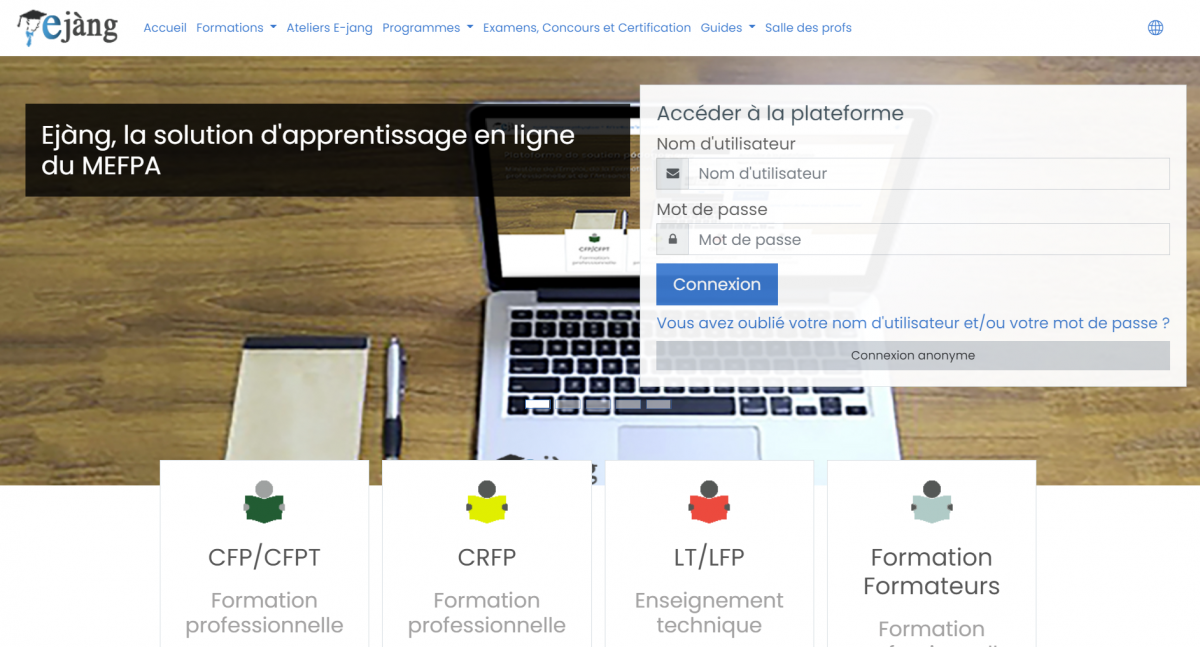Digitizing and adapting learning environments
A growing diversification of learning modes is both an advantage and a challenge for TVET systems. Many promising digital tools are emerging.
As a result of the closure of training institutions and social distancing measures, many initiatives have emerged in the TVET sector in response to the pandemic context. A difficult balancing act is at stake: guaranteeing continuity of learning and maintaining a connection between learners, trainers and companies. Some countries and stakeholders with more advanced TVET systems had anticipated this trend and started diversifying TVET learning modes before the pandemic, through digital content and solutions.
A transition to hybrid modes, combining in-person and distance learning, has long-term benefits:
- Hybrid systems help promote lifelong learning opportunities, in line with United Nations Sustainable Development Goal 4 (SDG 4).
- They help strengthen the resilience of TVET systems to cope with future external shocks.
However, the digitization of skills development faces a number of obstacles. The first related to the nature of TVET itself, whose "hands-on" approach makes it challenging to implement effective distance learning. Across Africa, the digital divide also limits access to high-tech solutions.
IIEP-UNESCO Dakar has identified several digital tools and initiatives that can help address the challenges of digitizing TVET in Africa.
In response to the closure of training institutions and the downturn in economic activity, many online training platforms have emerged or experienced a resurgence of interest. They are being developed by stakeholders from a variety of backgrounds, including private businesses, international organizations and civil society. By means of example, here are three interesting and complementary initiatives reflecting this trend.
- Global Skills Academy to help young people develop key skills
|
Launched by UNESCO in 2020 as part of the Global Coalition for Education, the Global Skills Academy offers a series of training courses developed by public and private stakeholders. The platform provides free access to programmes selected for their quality. Beneficiaries are identified with the help of the global network UNEVOC. The goal is to equip one million young people with the digital, entrepreneurial and leadership skills needed to build employability and resilience in the context of the pandemic. |
- International Partnership of Distance and Online Learning to access a wide variety of open educational resources
|
In the same spirit as the UNESCO-led initiative, the intergovernmental organization Commonwealth of Learning (COL) also launched its collaborative platform in 2020. It brings together more than 60 institutions and organizations around the world, committed to supporting learning in this time of crisis through digital solutions. The platform contains a large and varied directory of pooled resources, online training courses and shared expertise, accessible free of charge. |
- The platform Atingi, to simplify access to digital learning
|
In Africa, this platform, developed as part of an initiative of the German Federal Ministry for Economic Cooperation and Development (BMZ), has been extremely successful in recent months. It offers free online training content which covers a wide range of topics tailored to local needs and markets, targeting especially digital skills. The platform aims to improve the employability of young people and promote lifelong learning using novel methods, accessible in particular on smartphones. To meet the needs of its diverse target groups, Atingi also offers low-tech and offline solutions to overcome the barriers of Internet connectivity. |
- ENCAF: a digital ecosystem developed by employers, to support training
|
In the private sector, employers have also mobilized to support vocational training towards digitization, such as the ENCAF initiative (International Digital Ecosystem for Professional Skills). Launched in 2020 by Medef International, this digital ecosystem brings together in the form of a catalog, various digital educational modules and resources dedicated to the development of technical skills. Created on the initiative of employers, in collaboration with training organizations, ENCAF aims to support digital transformation and strengthen the link between training actors and companies through a partnership approach. Also recently deployed in Africa, ENCAF has already signed several agreements with African training organizations in order to develop a digital and shared catalog of educational content focused on technical professions targeted by African companies. |
While e-learning platforms provide educational continuity by making a wide variety of training content available to learners, they often struggle to meet the needs for practical skills.
There are a number of solutions to this critical problem for TVET, including:
- The distance learning solutions of Lucas Nülle, focusing on hands-on skills
|
This German company has developed learning systems for complex technologies such as electrical engineering, electronics and automation technology. Their software incorporates practical exercises into the theoretical learning modules. This private-sector initiative offers an innovative educational alternative in the context of the crisis. It thus promotes flexible learning through the development of practical modules accessible outside training institutions and businesses. |
- The portal FESTO Learning Experience to customize technical distance learning
|
In order to bridge the gap between theory and practice, another German company is leading a similar initiative. FESTO, which designs and markets industrial control and automation systems, has developed its own online training portal, with automation-related content and a customizable training environment. It targets industrial customers, but also technical education institutions, with class management features. The portal, free of charge in some of its components, emphasizes hybrid learning. It is already quite successful in several African countries, including Nigeria and South Africa. |
One of the challenges raised by the Covid-19 crisis is the low familiarity of trainers with digital technology. More broadly, social distancing and the forced adaptation of learning devices to online education have highlighted the importance of strengthening the place of digital skills in learning environments.
More and more initiatives have taken an interest in this question of "digital capacity" for learners and teachers. So the Project BEAR II "Better education for Africa's Rise", launched jointly by UNESCO and the Republic of Korea to support five East African countries in improving relevance, quality and perception of their TVET systems.
- Helping trainers to adapt to e-learning in Madagascar
|
As part of this initiative, UNESCO is supporting national systems in the training of trainers to e-learning, such as in Madagascar, where the state set up a program at the end of 2020 to strengthen the skills of TVET personnel in digitalization and Information and Communication Technologies in Teaching (ICTT). In order to support this digital capacity building program, the Malagasy state has developed 147 training modules and a specific platform that will be available until April 2022. |
Faced with the need to consolidate digital skills, a new perspective has also been brought to simulation environments, generally based on virtual reality (VR), to teach learners specific procedures and technical skills. While simulations cannot replace real learning in the workplace, they can fill certain gaps, particularly where social distancing is necessary. VR can also be used to develop the non-technical skills of learners.
- The experiment of PwC to teach soft skills
|
In the United States, the consulting firm PwC uses VR to help companies optimize the effectiveness of training in non-technical skills, or soft-skills. The behavioural skills targeted include leadership, resilience and change management. |
Beyond the initiatives taken by institutional or private actors, rapid changes in learning modes have also been observed in national TVET systems, in particular in Senegal.
- The platform Ejàng headed by the Senegalese government
|
This collaborative platform was set up by the Ministry of Employment, Vocational Training, Apprenticeship and Integration after schools were closed in Senegal. It makes training content available to students enrolled in TVET courses, with the aim of ensuring learning continuity. Students have online access to the basic guides and manuals, which are usually used for practical training in schools or in the workplace. A library of digital resources and audiovisual content is also available. Ejàng also enables trainers to schedule and run virtual classes and assess learning outcomes. This initiative demonstrates the agility of the Senegalese system and represents a model for any state actor wishing to support the digital transition of vocational training. |
- In Côte d'Ivoire, a digital platform for integrated public / private sector consultation (under development)
|
The Ivorian National Council of Professional Branches (CNBP) initiated the establishment of a digital platform for integrated public / private sector consultation in order to better involve the various economic actors in the field of youth integration. This initiative emerged facing the lack of information and data in terms of job offers and demands and the lack of integrated information sources to provide a global vision of needs, taking into account all the stakeholders. The objective of this platform is to enable Côte d'Ivoire to modernize its service offerings in terms of collaboration and coordination, in order to better respond to the new practices and needs of the populations, particularly of young people. The finalization and operationalization of this tool should facilitate the integration of young people into the labor market and thereby, support the reduction of unemployment. Through this initiative, we must salute the willingness of the various public and private actors to work together to support the youngest populations, who are the first victims of unemployment. |
Do you want to learn more about the digitization of TVET learning environments? IIEP-UNESCO Dakar has selected some additional resources on the subject.
- L’enseignement à distance en Afrique subsaharienne : états des lieux, enjeux et perspectives - Campus France
- The digitization of TVET and skills systems – ILO
- Guide d’un projet de formation hybride ou entièrement à distance - Agence Universitaire de la Francophonie (AUF)
- The role of digital labour platforms in transforming the world of work - OIT
- The digital learning turn in Africa: The role of local ecosystems - UNESCO











